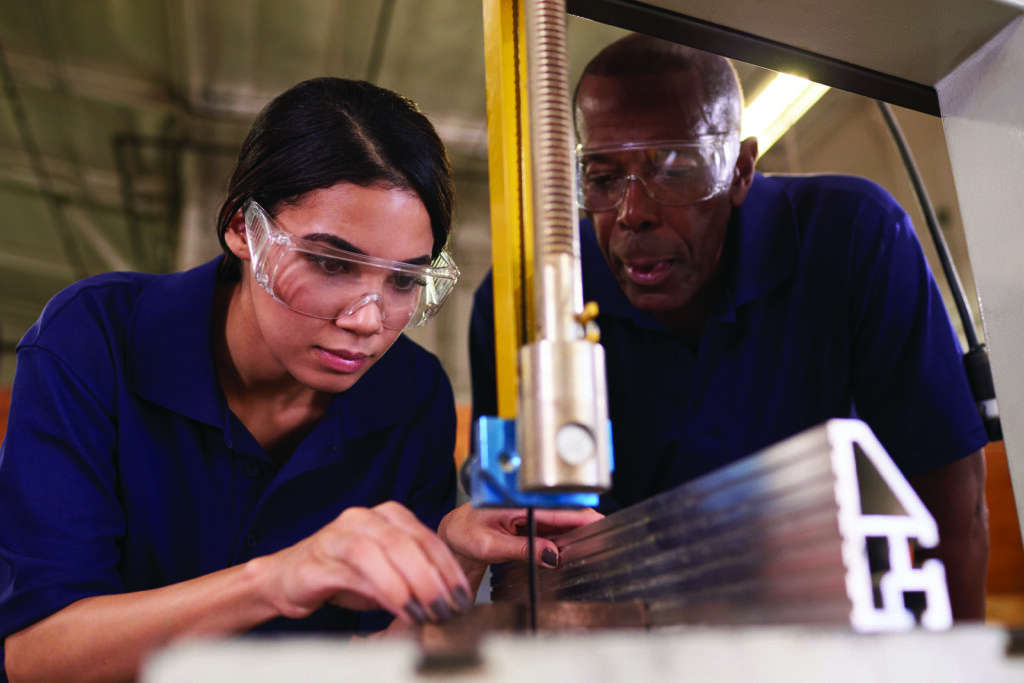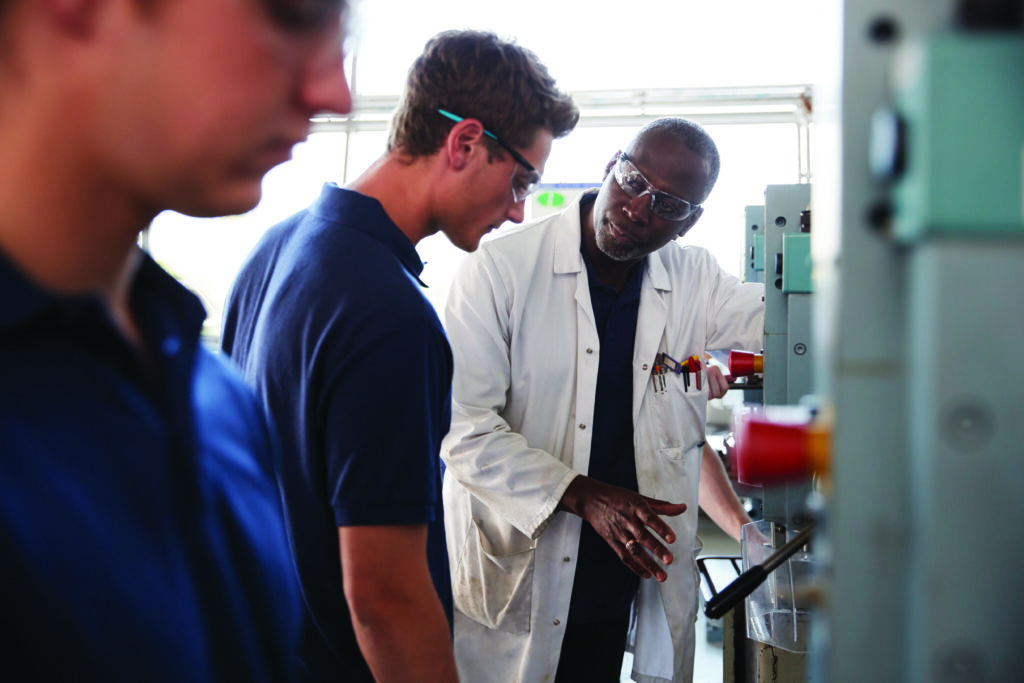THE “MANUFACTURING IN HIGHER EDUCATION ACT” IS PICKING UP STEAM
Bill A2014 Attempts to Align Critical Components in the Talent Pipeline to Help Foster a More Pro-Manufacturing Climate for New Jersey’s Youth
WHAT IS THE “MANUFACTURING IN HIGHER EDUCATION ACT”?
The United States—and New Jersey in particular—is experiencing a labor shortage and skills gap that is worsening month-over-month, with nearly 700,000 job vacancies reported in manufacturing in April alone. With the greenlighting of projects like the Offshore Wind Project and with immense investment in projects stemming from the CHIPS and Science Act, the strain on New Jersey Manufacturers is expected to increase. According to initial estimates, these projects alone will bring the creation of an additional 2,000 jobs in manufacturing by 2025, and a further 8,000 (totaling over 10,000 jobs) by 2030.
In order to meet all of these workforce demands, stemming from a constantly-evolving manufacturing sector, and to better prepare students for successful careers in manufacturing, the Assembly Science, Innovation, and Technology Committee voted recently to advance the “Manufacturing in Higher Education Act,” which was Sponsored by Assemblymen Conaway, Jr., Wirths, Umba, and co-sponsored by Assemblywomen Reynolds-Jackson, Piperno, and Flynn—who recently supported the manufacturing sector at NJMEP’s 10th Annual State-of-the-State of Manufacturing Summit—and many others. The purpose of this legislation is to create a more pro-manufacturing climate in education by aligning many of the critical players in the workforce development space in government, higher education, and K-12.
The Bill itself is tasked with establishing the New Jersey STEM Entrepreneur Fellowship Program in county colleges and four-year institutions, which will fund more than 20 fellowships whose focus will be on supporting entrepreneurs in the Science, Technology, Engineering, and Mathematics (STEM) fields. It also calls for the Commissioner of Education to work with such entities as the Secretary of Higher Education, the Business Action Center in the Department of State, the New Jersey Manufacturing Extension Program (NJMEP), and representatives of business and industry, to establish and maintain a State-recognized list of industry-backed credentials in the advanced manufacturing field, whose intent will be to assist vocational schools, colleges, and the workforce development system in developing appropriate educational programs that will enable students to meet the advanced technical training that’s required in manufacturing.
It also states that the Secretary of State, along with the Commissioner of Labor and Workforce Development, the New Jersey Economic Development Authority (NJEDA), and other State entities, will be tasked with directing resources, creating incentives, and providing technological, financial, and workforce development opportunities for manufacturing businesses.
In summary, the “Manufacturing in Higher Education Act of 2023” calls for:
- The creation of the New Jersey STEM Entrepreneur Fellowship Program
- Establishment of a “Higher Education Manufacturing Grant Program”
- A State-recognized list of industry-recognized credentials in the advanced manufacturing field
- A new role within the Business Action Center in the Department of State tasked with:
- Advertising manufacturing businesses’ products or services nationally and internationally
- Establishing a business referral service where manufacturing businesses may be referred to other State, federal, or private business resource organizations
- The designation of resources, incentives, and technological, financial, and workforce development opportunities for manufacturing businesses
- The assignment of an institution of higher education or other entity as a manufacturing and production business resource center
- The creation of the New Jersey Advanced Manufacturing Council

REFUELING THE TALENT PIPELINE
While on the surface it might not appear as though there are any immediate gains for New Jersey Manufacturers, the benefits can be found in playing the long-game—refueling the talent pipeline which has laid dormant for decades. For Assemblyman Hal Wirths, Co-Sponsor of Bill A2014 AcaAca (2R), this legislation offers a two-pronged approach:
“Creating manufacturing career pathways for students in New Jersey helps achieve two goals,” he says, “One, it ensures there are qualified candidates who can fill manufacturing jobs and two, it stops the brain drain by connecting graduates to high-paying careers in the state.”
The purpose is to create a better-trained, more adept, manufacturing workforce, or as the Bill itself states, “to provide students interested in pursuing a career in manufacturing with the instruction and skills necessary to gain employment in the manufacturing or advanced manufacturing sectors.” This will hopefully allow manufacturers to hire the skilled staff required to bridge the skills gap without having to spend vital resources on training new hires with essential skills—which will leave more room and resources for innovation and advancement of manufactured products and technologies.
The second part of Wirths’ sentiment is that it’s vital for the manufacturing industry to provide students and prospective hires with information that shows the benefits of an advanced manufacturing career—like the fact that the average salary for a full-time manufacturing employee is $97,000. If more students were better informed about all the career potential, then there would certainly be more interest in employment opportunities in manufacturing, especially for those looking for an alternative to a four-year degree.
CREATING DEDICATED PATHWAYS TO MANUFACTURING CAREERS

“Two of New Jersey’s greatest economic strengths are our pool of motivated and educated students and growing manufacturing industry,” says Wirths, “Putting the two together is a win-win.”
The “Manufacturing in Higher Education Act” will essentially establish a manufacturing career pathway through the New Jersey Community College Consortium’s workforce development initiative—the Pathways to Career Opportunities—which is a collaboration between New Jersey’s industry leaders, employers, and education partners. Since its inception in 2021, the Pathways Initiative has connected educational institutions, state entities, and roughly 1,200 education and industry partners together to help combat the skills gap and labor shortage. This act would build upon the success of that initiative and expand its scope even further.
“The manufacturing industry touches all 21 counties in the state. From food to machinery, there are employment opportunities in every sector. Ensuring students can find and qualify for these careers is an investment in New Jersey families and our state’s economy,” Assemblyman Umba said. “In order to remain competitive and have our students be successful, we have to keep up with the industry and modernize our educational programs.”
